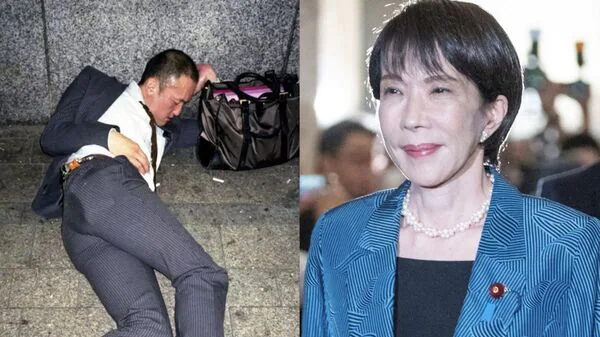
Japan's Tireless Work Culture Returns To Spotlight: Street-Napping Employees, Sleepless PM And Fears Of 'Overwork Death'
Appearing before a legislative committee, Takaichi said:“I sleep about two hours now, four hours at the longest. I feel it's bad for my skin.”
Her comments immediately set off criticism from opposition lawmakers and workers' unions, who argued that Japan's leader should be setting an example in promoting healthier work-life boundaries - not reinforcing extreme work habits.
Japan's overwork crisis is well documented. The country even has a dedicated term for deaths caused by excessive work: karōshi.
The government is now reportedly considering raising the cap on overtime hours to boost economic growth, further fuelling concern among labour groups. According to the labour ministry, nearly 1 in 5 white-collar workers is at risk of overwork-related illnesses, including strokes, cardiac issues and severe mental stress.
Foreign Workers Say Even Feedback Feels ExhaustingAlongside long hours, international workers in Japan often struggle with another aspect of the country's workplace culture: hyper-polite, indirect communication.
A viral Reddit post described it as“feedback so subtle it feels like a puzzle,” with employees rarely told directly whether their performance is good or poor.
“No one ever says 'good job' or 'you made a mistake'. It's always: 'Maybe next time, try a different way.' It's exhausting trying to read between the lines,” the user wrote.
This style - rooted in tatemae, or maintaining social harmony - can leave newcomers feeling confused and anxious about their standing at work.
Indian Fresher's Salary Breakdown Sparks Conversation On Living CostsThe conversation around Japan's work-life balance also intersects with growing concerns about stagnant wages and high living costs.
An Indian software engineer, Vicky Kumar, recently went viral after sharing his monthly salary breakdown in Japan. While his base pay is 235,000 yen ( ₹1.35 lakh), deductions - including 20,000 yen for lacking a Japanese language certificate - reduce his take-home pay to about 175,000 yen (roughly ₹1 lakh).
The post sparked debate online, with many noting that such an amount barely covers basic expenses in cities like Tokyo and Osaka.
Salarymen Sleeping On StreetsOne of the most recognisable symbols of Japan's exhausting work expectations is the sight of“salarymen” asleep on pavements, train station steps or benches after missing the last train home - often following long office hours and obligatory after-work drinking sessions.
Photographer Pawel Jaszczuk captured this in his series High Fashion, documenting suited professionals collapsed on sidewalks, briefcases still in hand. The images have resurfaced in conversations about Japan's work culture, serving as a stark reminder of how fatigue and social pressure often replace rest.
A System Under StrainFrom an overworked Prime Minister and rising concerns around karōshi, to foreign workers struggling with indirect communication and young professionals questioning whether their salaries match living costs - Japan's work culture shows signs of deep, structural strain.
Despite government campaigns encouraging shorter hours and better boundaries, many argue that meaningful change remains slow.
As Japan faces labour shortages, an ageing population and global competition, the question remains:
Can the country evolve without pushing its workers beyond their limits?
Legal Disclaimer:
MENAFN provides the
information “as is” without warranty of any kind. We do not accept
any responsibility or liability for the accuracy, content, images,
videos, licenses, completeness, legality, or reliability of the information
contained in this article. If you have any complaints or copyright
issues related to this article, kindly contact the provider above.

















Comments
No comment